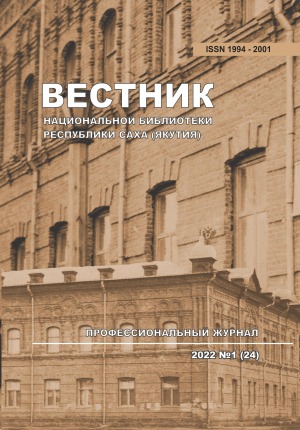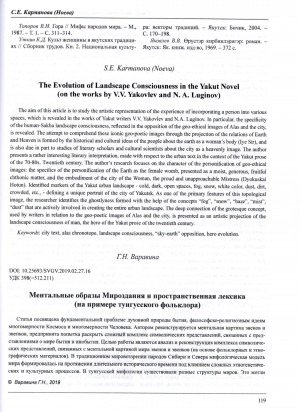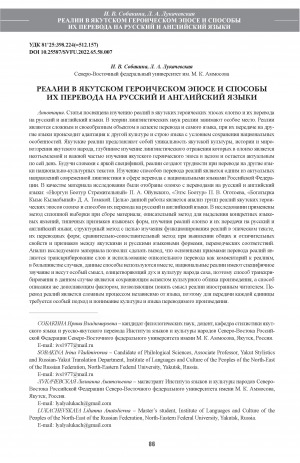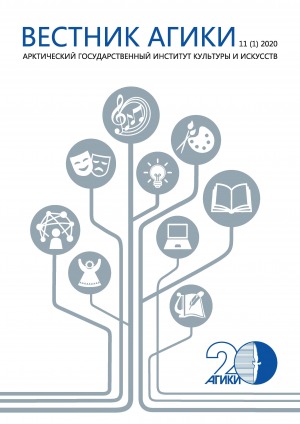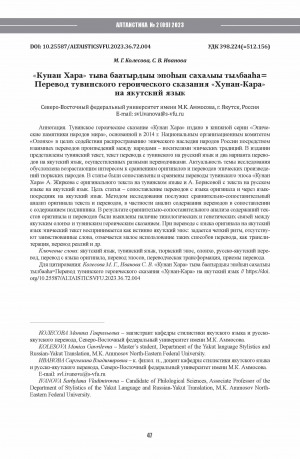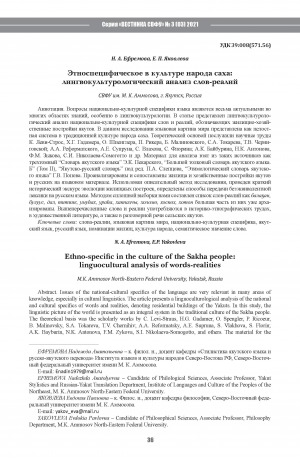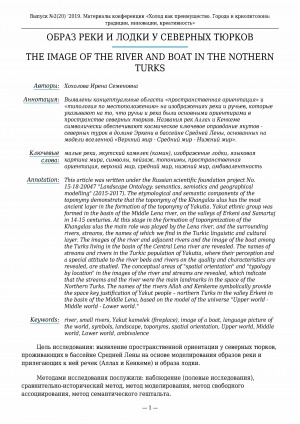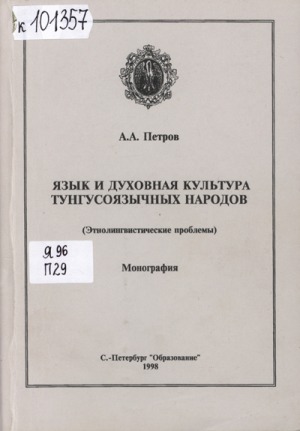
The Even Language: Studying, Teaching and Linguistic Ecology Challenges = Эвенский язык: исследования, преподавание, вызовы лингвоэкологии
Статья в журнале
2021
Journal of Siberian Federal University Humanities & Social Sciences
Journal of Siberian Federal University Humanities & Social Sciences
Статья посвящена истории изучения и преподавания эвенского (ламутского) языка в России в период с XVII– по начало XXI века. Отдельное внимание уделено проблеме лингвоэкологии языка. Рассматриваются фундаментальные и прикладные исследования в синхронном и диахроническом аспектах, а также вопросы преподавания эвенского языка в семье, дошкольных образовательных учреждениях, колледжах и высших учебных заведениях России. Изучаются возможности этнолингвистики для сохранения и развития языка: преподавание эвенского языка в тесной связи с традиционной и современной материальной и духовной культурой. Для этого устанавливается роль лексики, связанной с песенно-танцевальным творчеством, с декоративно-прикладным искусством, обрядовой лексики жизненного цикла (рождение, свадьба, похороны), производственной (охотничьи, рыболовецкие, оленеводческие обряды) лексики; табу и эвфемизмов; лексики, связанной с народными знаниями (метрология, метеорология, ориентация в пространстве, медицина, календарь, питание и кухня и др.), а также слов, отражающих религиозные воззрения (анимизм, шаманизм, христианство) в формировании языковой картины мира и менталитета эвенов. Отмечена роль государственных институтов, общественных организаций, а также самих представителей малочисленного этноса в сохранении и развитии своих языка и культуры. Обращено внимание на перевод как инструмент сохранения уникального языка
Petrov, Alexander A.
. The Even Language: Studying, Teaching and Linguistic Ecology Challenges = Эвенский язык: исследования, преподавание, вызовы лингвоэкологии / Petrov A. A., Razumovskaya V. A. // Journal of Siberian Federal University Humanities & Social Sciences. - 2021. - N 14.- P. 822-833. URL: https://elib.sfu-kras.ru/handle/2311/141350 (дата обращения: 20.03.2024). - References: p. 832-833 (9 titles). - [16+]. - The article is devoted to the history of the study and teaching of the Even (Lamut) language in Russia in the period from the 17th – to the beginning of the 21st century. Special attention is paid to the problem of linguistic ecology. The fundamental and applied researches in the synchronic and diachronic aspects, as well as issues of teaching the Even language in families, pre-school educational institutions, colleges and higher educational institutions of Russia are studied. Ethnolinguistics is considered as a possible tool of language preservation and development, i. e., the Even language teaching in the close connection with traditional and modern material and spiritual culture. In this way, the role of vocabulary reflecting the song and dance creative activity, decorative and applied art, ceremonies (of life cycle: birth, wedding, funeral) and economy (hunting, fishing, reindeer breeding), taboo and euphemisms, folk knowledge (metrology, meteorology, space orientation, medicine, calendar, food and cuisine, etc.), as well as the words of religious beliefs (animism, shamanism, Christianity) in the formation of a language picture of the world and the Evens’ mentality is being determined. The role of state institutions, civil society organizations, as well as the members of small-numbered ethnic groups per se in the preservation and development of their language and culture is described. The attention is paid to the translation as the tool of a unique language preservation. - Статья посвящена истории изучения и преподавания эвенского (ламутского) языка в России в период с XVII– по начало XXI века. Отдельное внимание уделено проблеме лингвоэкологии языка. Рассматриваются фундаментальные и прикладные исследования в синхронном и диахроническом аспектах, а также вопросы преподавания эвенского языка в семье, дошкольных образовательных учреждениях, колледжах и высших учебных заведениях России. Изучаются возможности этнолингвистики для сохранения и развития языка: преподавание эвенского языка в тесной связи с традиционной и современной материальной и духовной культурой. Для этого устанавливается роль лексики, связанной с песенно-танцевальным творчеством, с декоративно-прикладным искусством, обрядовой лексики жизненного цикла (рождение, свадьба, похороны), производственной (охотничьи, рыболовецкие, оленеводческие обряды) лексики; табу и эвфемизмов; лексики, связанной с народными знаниями (метрология, метеорология, ориентация в пространстве, медицина, календарь, питание и кухня и др.), а также слов, отражающих религиозные воззрения (анимизм, шаманизм, христианство) в формировании языковой картины мира и менталитета эвенов. Отмечена роль государственных институтов, общественных организаций, а также самих представителей малочисленного этноса в сохранении и развитии своих языка и культуры. Обращено внимание на перевод как инструмент сохранения уникального языка.
Войдите в систему, чтобы открыть документ

